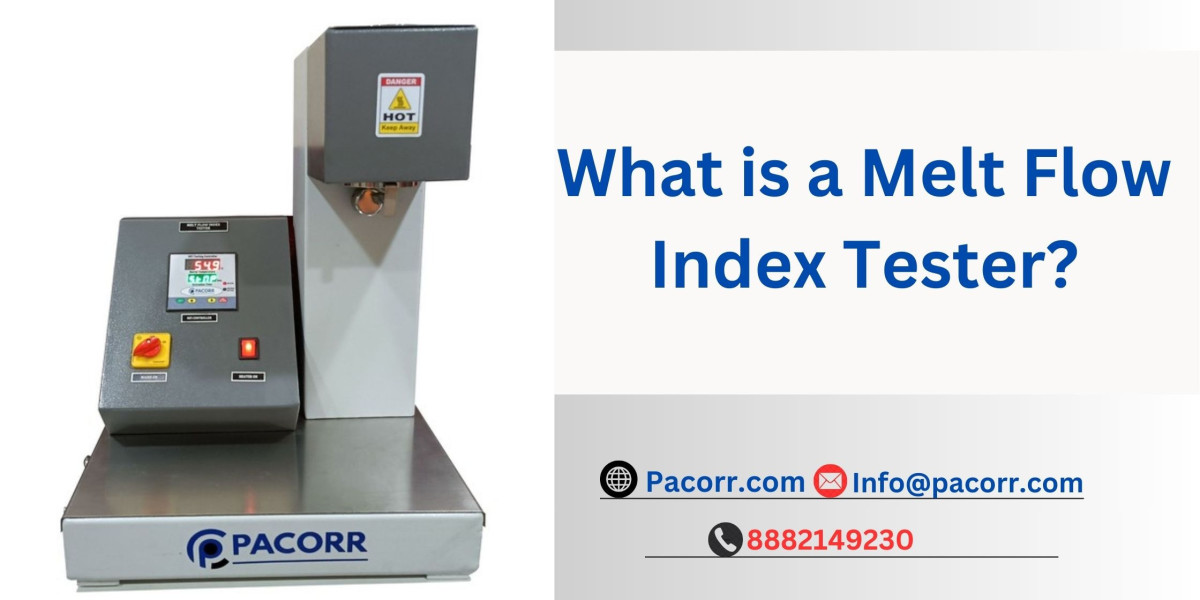Introduction
In the fast-paced world of polymer manufacturing, maintaining the highest quality standards is essential. One key tool that ensures polymers meet these standards is the Melt Flow Index Tester Price (MFI). At Pacorr, we understand the critical role that this testing instrument plays in providing accurate data to help manufacturers make informed decisions.
What is the Melt Flow Index (MFI)?
The Melt Flow Index (MFI), also known as Melt Flow Rate (MFR), measures the rate at which a polymer material flows under specific conditions of temperature and pressure. It is an essential rheological property that reflects how a polymer behaves when melted, making it one of the most important indicators of its processability.
The test involves heating a sample of polymer to its melting point and forcing it through a die under a defined pressure. The time it takes for a certain amount of the material to flow is recorded, giving a melt flow index value. Higher Melt Flow Index Tester values indicate that the polymer has lower viscosity and flows more easily, while lower values suggest that the polymer is thicker and more resistant to flow.
Why is Melt Flow Index Testing Important?
- Quality Assurance and Consistency
One of the primary uses of a Melt Flow Index Tester is to ensure consistency in the polymer production process. Variations in MFI can directly affect the properties of the final product. By regularly testing the melt flow index, manufacturers can maintain uniformity in their output, ensuring that each batch of polymer has consistent characteristics that meet industry standards.
- Material Characterization
For polymer producers, MFI testing offers vital insights into the polymer’s processing behavior. This helps characterize the material’s flow properties, which are essential for applications such as injection molding, extrusion, and film production. Understanding these properties helps manufacturers select the right materials for specific processes.
- Predicting Processing Behavior
Melt flow index testing can predict how a polymer will behave during manufacturing. A polymer with a higher MFI will flow more easily, which can be advantageous in certain processes such as extrusion or injection molding. Conversely, materials with lower Melt Flow Index Testing values might be more suitable for applications requiring higher structural integrity, such as engineering plastics.
- Regulatory Compliance
Polymers used in various industries—particularly in the automotive, medical, and food packaging sectors—must comply with stringent industry standards. Melt flow index testing helps manufacturers confirm that their products meet these requirements, ensuring compliance with regulations and industry benchmarks.
How Does a Melt Flow Index Tester Work?
A Melt Flow Index Tester consists of several key components that work together to measure the flow properties of the polymer sample accurately:
- Barrel: This is where the polymer sample is placed for testing. The barrel is heated to a specified temperature to melt the polymer.
- Die: The die is a small opening through which the molten polymer is forced during testing. The size of the die can vary depending on the test requirements.
- Weight/Pressure: A specific weight is applied to the polymer to force it through the die. The pressure applied during the test is critical in determining the melt flow rate.
- Measuring System: The amount of polymer that flows through the die is measured over a specific time period. The tester typically records the weight of the polymer that flows through the die in 10 minutes, known as the "grams per 10 minutes" or g/10min.
Applications of Melt Flow Index Tester
- Polymer Production
In the polymer production process, the Melt Flow Index Testing Machine serves as an essential tool for ensuring the proper formulation of plastic resins. Whether it's polyethylene, polypropylene, or any other thermoplastic, understanding the melt flow behavior is crucial for processing and manufacturing.
- Plastic Processing Industries
The Melt Flow Index Tester is indispensable in industries such as film extrusion, blow molding, and injection molding. It helps predict how the material will flow during the production process, which impacts the overall production efficiency and quality.
- Material Development and Research
Researchers and material scientists use MFI testers to develop new materials and understand how the polymers behave under different conditions. MFI testing is fundamental in developing new plastic formulations with specific characteristics, such as improved flow rates or resistance to stress.
- Automotive Industry
The automotive industry uses polymers extensively in vehicle manufacturing, especially in areas requiring lightweight materials that are durable. Melt flow index testing helps ensure that the polymers used meet the performance requirements and flow properties needed for automotive applications.
Benefits of Using a Melt Flow Index Tester
- Accuracy and Reliability
At Pacorr, our Melt Flow Index Tester is designed to provide accurate and repeatable results. Consistency in measurements is essential for manufacturers to maintain the quality of their products over time.
- Ease of Use
Our MFI testers are built to be user-friendly, allowing operators to perform tests without extensive training. Clear interfaces and automated systems ensure that operators can focus on analyzing results instead of managing complex test procedures.
- Speed and Efficiency
The Melt Flow Index Tester allows for rapid testing, enabling manufacturers to conduct several tests in a short amount of time. This efficiency is particularly beneficial in environments with high production volumes.
- Cost-Effective Quality Control
Implementing an MFI tester in your quality control process helps detect inconsistencies in polymer batches early, preventing costly defects in production. Identifying issues before they become widespread can save time and money, as well as reduce waste.
Why Choose Pacorr’s Melt Flow Index Tester?
- Precision Engineering
Pacorr’s Melt Flow Index Tester is engineered with precision to provide accurate, reliable results every time. Our testers adhere to the highest international standards, ensuring that manufacturers can trust the data they receive for quality control.
- Durable and Reliable
Constructed from high-quality materials, Pacorr’s Melt Flow Index Tester is built to withstand the rigors of daily use in manufacturing environments. Its durability ensures that you can rely on the equipment for years to come without concerns of breakdowns or inaccuracies.
- Easy to Operate
Our Melt Flow Index Tester Price are designed with simplicity in mind, offering an intuitive interface and easy-to-follow operation procedures. With just a few steps, operators can conduct tests, analyze results, and make informed decisions.
- Customizable Features
At Pacorr, we understand that every manufacturing process is different. That’s why our Melt Flow Index Testers come with customizable options to suit your specific needs. Whether you require different die sizes, temperature control ranges, or weight options, our testers can be tailored to meet your testing requirements.
Conclusion
In the world of polymer manufacturing, a Melt Flow Teste is indispensable for ensuring the quality and consistency of materials used in a variety of industries. Whether you're producing films, automotive parts, or plastic products, this tool allows you to monitor the flow properties of materials, ensuring that they meet the necessary standards. At Pacorr, we are committed to providing top-quality testing instruments that empower manufacturers to optimize their production processes, enhance product quality, and meet compliance standards.







